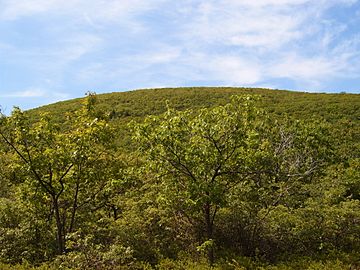Bear Mountain (Connecticut) facts for kids
Quick facts for kids Bear Mountain |
|
|---|---|

Bear Mountain
|
|
| Highest point | |
| Elevation | 2323+ ft (708+ m) |
| Prominence | 433 ft (132 m) |
| Geography | |
| Location | Salisbury, Connecticut, USA |
| State/Province | US-NY |
| Parent range | Taconic Mountains |
| Topo map | USGS Ashley Falls |
| Geology | |
| Age of rock | Ordovician |
| Mountain type | Thrust fault; metamorphic rock |
| Climbing | |
| Easiest route | Appalachian Trail |
Bear Mountain is a very noticeable mountain peak. It is part of the southern Taconic Mountains. You can find it in the town of Salisbury, Connecticut, in the United States.
Bear Mountain is special because it is the highest mountain summit in the state of Connecticut. A summit is the very top point of a mountain. However, the absolute highest point in Connecticut is actually on the side of another mountain called Mount Frissell.
Contents
Exploring Bear Mountain
Bear Mountain is a popular spot for people who love the outdoors. It offers great views and a chance to explore nature.
Where is Bear Mountain Located?
Bear Mountain is in the northwest corner of Connecticut. It sits right near the border with New York and Massachusetts. This area is known for its beautiful hills and forests.
How Tall is Bear Mountain?
Bear Mountain stands over 2,323 feet (708 meters) tall. This makes its summit the highest point you can reach on a mountain entirely within Connecticut. It's a great achievement for hikers to reach the top!
Hiking on Bear Mountain
One of the most famous trails in the world, the Appalachian Trail, goes right over Bear Mountain. This long trail stretches for thousands of miles. It goes from Georgia all the way to Maine. Hikers can follow parts of this trail to reach the summit of Bear Mountain. It's a challenging but rewarding hike.
How Bear Mountain Formed
Bear Mountain was formed a very long time ago. It was created by powerful forces deep within the Earth. Geologists, who study rocks and how the Earth changes, say it's a "thrust fault." This means huge pieces of rock were pushed up and over each other. The mountain is also made of "metamorphic rock." This type of rock changes over time due to heat and pressure. These changes happened during a period called the Ordovician period, millions of years ago.
Images for kids
 | Stephanie Wilson |
 | Charles Bolden |
 | Ronald McNair |
 | Frederick D. Gregory |


